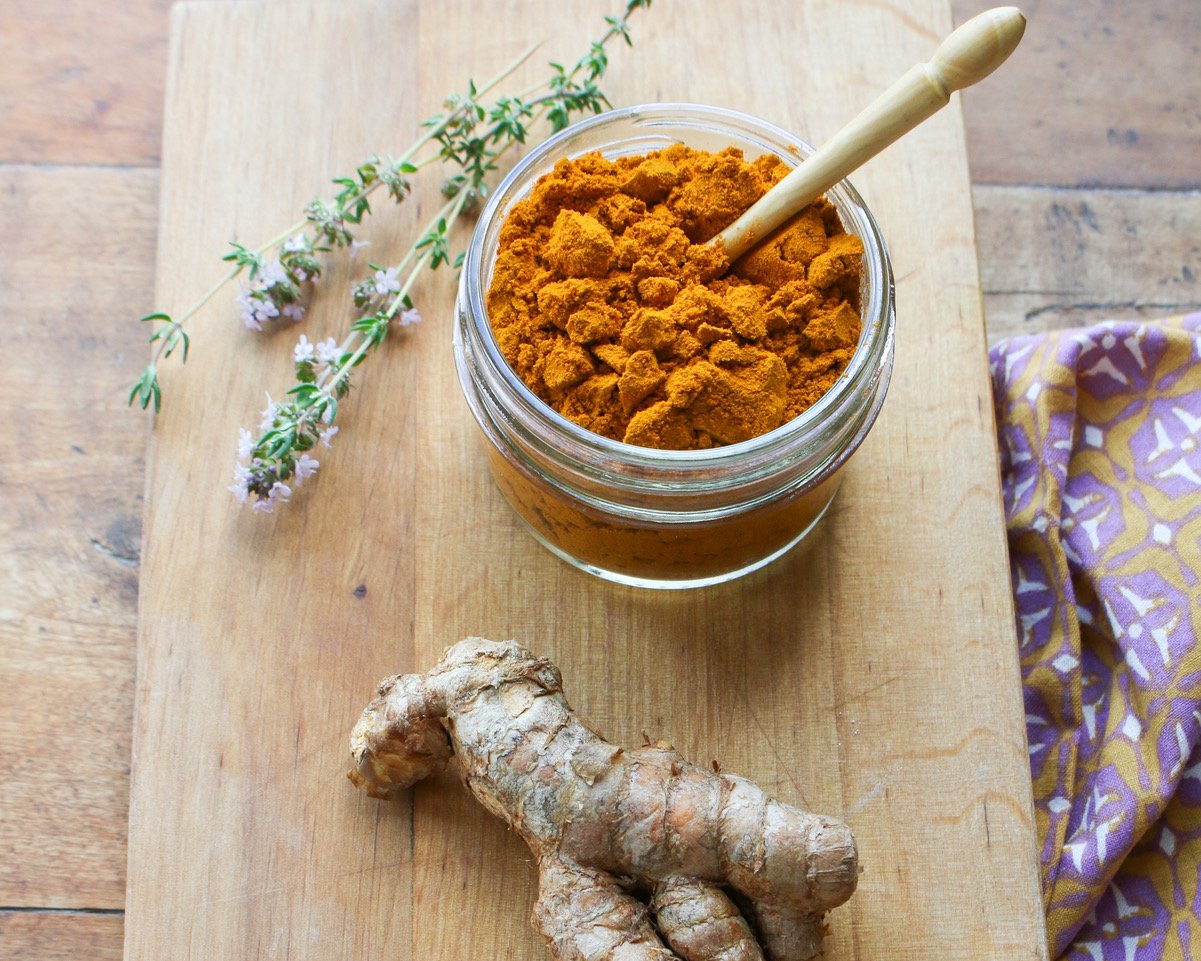Insomnia, anxiety, low mood, cravings, bloating – if you regularly suffer from PMS symptoms – here’s a rundown of supplements that can help say the experts
Do you often feel more moody, irritable, tired and bloated in the days leading up to your period?
These are just some of the typical symptoms of premenstrual syndrome (PMS).
‘Premenstrual syndrome is a common and distressing problem affecting as many as one in two women,’ says Dr Sarah Brewer, Consultant Medical Nutritionist.
‘There are more than 150 symptoms that may be attributed to PMS. These can start anytime within the two weeks before a period and cease as soon as bleeding occurs. Common symptoms tend to fall into one of four main groups, and often overlap.
Premenstrual syndrome is a common and distressing problem affecting as many as one in two women
The main symptoms with PMS-A are anxiety irritability and insomnia. PMS-C symptoms may include sugar cravings, increased appetite, headache and fatigue, and with PMS-D there may be symptoms such as depression, forgetfulness and confusion. PMS-H (for hyper-hydration), is characterised by fluid retention, weight gain, bloating and breast tenderness.
‘Symptoms can appear at any age between puberty and menopause but are more common in women between their 20s and 40s,’ says Dr Brewer.
‘Certain factors such as stress, poor diet and nutritional deficiencies can make symptoms worse. Also, during perimenopause, when reproductive hormones start to decrease and fluctuate symptoms can vary enormously.
‘While a healthy lifestyle is the first step to managing PMS, taking supplements can also be very helpful. Supplements are thought to help two out of three women with symptoms, and it normally takes around three months to assess the full benefits’.
READ MORE: The PMS fix proven by science
Top supplements to manage PMS symptoms
PMS Supplement #1 Calcium
‘Calcium is an essential mineral required by the body to support healthy bones and teeth, regulate muscle contractions and for healthy blood clotting,’ says Rob Hobson, Consultant Nutritionist at supplement brand Healthspan.
‘Your body doesn’t produce it naturally, so it’s important to get it from your diet’.
Good sources of calcium include dairy foods (e.g.: cheese, yoghurt, milk), leafy greens, beans, lentils, almonds, sardines, seeds.
What does the science say?
‘If you suffer from PMS, you’re more likely to be low in calcium,’ says Rob.
‘A recent US review of 14 studies (International Journal Preventive Medicine, 2020) has shown that calcium levels were lower in women with PMS. The findings also suggest that taking calcium supplements can significantly improve PMS symptoms.
‘While earlier studies indicated that a daily intake of 1000mg calcium reduced PMS symptoms, more recent studies suggest that lower doses are equally effective.
calcium levels were lower in women with PMS
‘In one US study (Obstetrics & Gynaecology Science, 2017) it was found that taking 500mg calcium supplements daily for two months reduced symptoms, including low mood and water retention’.
Who should take it?
Clues that you may be calcium deficient include fatigue, muscle aches and cramps, brittle nails and hair, dry skin, low mood, dental problems and PMS symptoms.
According to the National Diet and Nutrition Survey 22 per cent of teenage girls and 11 per cent of women are low in calcium.
‘You need to get around 700mg calcium a day,’ says Rob.
‘If you suffer from PMS and suspect you may be low in calcium, take supplements for at least three months. To fully utilise and absorb calcium properly, you also need vitamin D3’.
Try: Healthspan Calcium & Vitamin D, £9.95
READ MORE: Training for women – 7 reasons women should eat & train differently to men

PMS Supplement #2 Agnus Castus
Agnus Castus (vitex Agnus Castus) also known as ‘chasteberry’, is a herbal remedy (derived from the fruit extract of the Chaste tree, which grows in the Mediterranean).
This remedy has traditionally been used to treat women’s reproductive issues, hormonal imbalances and PMS.
‘Agnus Castus can be very helpful during peri-menopause, when oestrogen levels fluctuate before they decline at menopause,’ says Dr Anne Henderson, Gynaecologist and Menopause Specialist at the Kent Menopause Clinic.
physical symptoms such as breast tenderness and bloating
‘Although, for many women PMS episodes may become less frequent as they enter perimenopause, the severity of symptoms often escalates, particularly psychological difficulties such brain fog, anxiety, low mood, and problems with cognition, memory, concentration and focus.
‘Women may also experience increased physical symptoms such as breast tenderness and bloating’.
What does the science say?
In a review (Planta Med, 2013) of eight trials it was shown that Agnus Castus was effective in reducing the symptoms of PMS, including breast tenderness, low mood and anxiety.
In (severe PMS) one study that involved participants who suffered from premenstrual dysphoric disorder (severe PMS), Agnus Castus was shown to be equally effective as fluoxetine (Prozac) in reducing psychological symptoms.
In another study (Electronic Physician, 2017) it was shown that agnus castus was very beneficial in the treatment of moderate to severe PMS.
Who should take it?
‘Agnus can be used by anyone who suffers from PMS symptoms or is going through perimenopause,’ says Dr Henderson.
‘The recommended dosage is 15 to 20ml in a little water, twice daily. It should be taken every day of the menstrual cycle (not just the week before your period). It can take anything from one to two months to notice a difference.
‘Although, Agnus Castus can be taken long term, it’s best to stop once your cycle and PMS symptoms have improved sufficiently’.
Try: A.Vogel Agnus Castus Oral Drops is a licensed herbal remedy, £11.99 for 50ml – avogel.co.uk
SAFETY NOTE – ‘Agnus Castus should not be used if you are already taking progesterone-containing medication, the contraceptive pill or hormone replacement therapy due to the possibility of herb-drug interactions,’ says Dr Chris Etheridge, Chair of the British Herbal Medicines Association and medical herbalist.
‘Care should also be taken by those taking some antipsychotic drugs or medications for Parkinson’s disease. Agnus-castus should not be used during pregnancy or breast feeding.’
‘It’s also important not to take if women are taking anti-oestrogens, dopamine agonists, or if you have oestrogen sensitive cancer’.
Try: A.Vogel Agnus Castus Oral Drops as a licensed herbal remedy, £11.99.
READ MORE: 9 symptoms of magnesium deficiency that could be ruining your life

PMS Supplement #3 Magnesium
‘Magnesium is an essential mineral that is involved in over 300 bodily functions,’ says Dr Brewer.
‘It helps to convert food into energy, regulates blood pressure, is crucial for healthy bone formation, and supports muscle, nerve and immune function. It also has a natural calming effect on the nervous system.
‘Latest research also shows that magnesium supplements may help to reduce the symptoms of PMS symptoms including anxiety, depression, bloating, tiredness and headaches’.
What does the science say?
‘A recent review (Nutrition & Food Science Journal, 2021) has shown that magnesium levels are lower in women with PMS than those with no symptoms,’ says Rob Hobson.
Magnesium also acts as a muscle relaxant and can help to reduce period pain
‘The review (of several studies) also found that supplementing with magnesium has been shown to significantly improve PMS symptoms including fluid retention, weight gain, bloating, anxiety and breast pain.
‘Magnesium also interacts with vitamin B6 to reduce the effects of excess oestrogen (which can trigger or make PMS symptoms worse)’.
Who should take it?
‘If you are deficient in magnesium, taking supplements can help to reduce PMS symptoms such as irritability, depression, anxiety, bloating and headaches,’ says Rob.
‘Magnesium also acts as a muscle relaxant and can help to reduce period pain. For best results, take between 200 to 375 mg daily, ideally with vitamin B6’.
Try: Lloyds Pharmacy Magnesium with B6, £2.99
READ MORE: Top Dietitian explains the first 4 KEY steps to successful weight loss

PMS Supplement #4 Gingko Biloba
‘Gingko biloba is a herbal remedy derived from the leaves of the Gingko tree, which grows in China,’ says Dr Sarah Brewer.
‘It has been used in Chinese medicine for thousands of years. The leaves of the gingko plant contain a wide range of antioxidant compounds which help to reduce inflammation, improve blood circulation and reduce fluid retention’.
What does the science say?
‘Research shows that gingko biloba can be particularly effective in reducing congestive symptoms of PMS, including breast pain or tenderness,’ says Dr Brewer.
The leaves of the gingko plant contain a wide range of antioxidant compounds
In one study on 165 women with congestive symptoms such as bloating and breast tenderness, the women who took gingko biloba supplements for two months, experienced significant improvements in symptoms, compared to those who took placebos.
In another study (Journal of Alternative and Complementary Medicine, 2009) on 85 women, those who took 40mg gingko biloba three times a day (from day 16 of their menstrual cycle to day 5), experienced a marked reduction in the severity of their overall symptoms.
Who should take it?
‘Take gingko biloba if your symptoms include breast pain or tenderness, boating and water retention,’ says Dr Brewer.
Try: A. Vogel Gingko Biloba drops, £20.99
READ MORE: 5 foods proven to reduce stress and anxiety

PMS Supplement #5 Vitamin B6
‘Vitamin B6 (pyridoxine) is one of the B vitamins,’ says Rob Hobson.
‘Vitamin B6 helps the body to convert food into energy and form haemoglobin to produce healthy, red blood cells. You also need vitamin B6 to create neurotransmitters that help to regulate mood and emotions.
emotional symptoms decreased by 63 per cent and physical symptoms by 52 per cent
‘This is a water-soluble vitamin, which means it can’t be stored in the body. So, levels are easily depleted (e.g: through stress, poor diet)’.
What does the science say?
‘In a classic study (published in the Journal of the Royal College of General Practitioners, 1989) on 68 women, it was found that on taking a 50mg daily vitamin B6 supplement for three months, reduced symptoms of PMS including depression, irritability and tiredness,’ says rob Hobson.
‘Overall, emotional symptoms decreased by 63 per cent and physical symptoms by 52 per cent. This effect is thought to be the result of vitamin B6’s role in neurotransmitter synthesis’.
Who should take it?
‘Vitamin B6 appears to be most helpful if you are most troubled by emotional or psychological symptoms of PMS – e.g: anger, irritability, mood swings. Take 50mg every day for 3 months’.
Try: Healthspan High Strength Vitamin B Complex, £8.96 – also, available to buy on Amazon.
READ MORE: 5 ways turmeric can help you make the most out of your workouts

PMS Supplement #6 Curcumin
‘Curcumin is the primary active compound in turmeric that has powerful anti-inflammatory and antioxidant properties,’ says Rob Hobson.
‘Supplementing with curcumin can help with a wide range of conditions, including PMS symptoms. Curcumin, however, is poorly absorbed. But you can enhance absorption by taking it in combination with piperine, a compound found in black pepper’.
What does the science say?
‘Research suggests that curcumin may help to alleviate PMS symptoms,’ says Rob.
‘As well as helping to dampen down inflammation that may be triggering physical symptoms, curcumin also has beneficial effects on the neurotransmitters (dopamine, serotonin, norepinephrine) that influence mood.
enhance absorption by taking it in combination with piperine, a compound found in black pepper
‘In one study (Complementary Therapies in Medicine 2015) it was shown that supplementing with 100g curcumin daily, for seven days before menstruation, and three days afterwards, helped to reduce symptoms of PMS’.
Who should take it?
‘Take a curcumin supplement (which also contains piperine) if you suffer from PMS induces irritability, anxiety, headaches, cramps, tiredness and lack of energy,’ says Rob.
‘Start taking a week before your period is due and three days after. But you can also take curcumin daily as it has benefits for overall health’.
Try: Healthspan Turmeric 10,0000, with Bioperine, £15.95 – also available to buy on Amazon.
READ MORE: 4 ways the menopause affects your skin

PMS Supplement #7 Evening Primrose Oil
‘Evening primrose oil is extracted from the beautiful evening primrose plant,’ says Dr Sarah Brewer.
‘The evening primrose oil is extracted from the seeds and is a rich source of a fatty acid, called GLA (gamma linoleic acid). GLA is an unusual omega-6 fatty acid, which has the anti-inflammatory properties, more usually associated with omega-3s.
1.5 mg taken daily for three months significantly helped to reduce PMS symptoms
‘This fatty acid is converted into prostaglandins, substances that reduce inflammation and also help to relax blood vessels, lower blood pressure, and improve circulation and nerve function’.
What does the science say?
‘GLA appears to be especially helpful in the treatment of symptoms associated with low mood, sugar cravings and breast pain linked to PMS,’ says Dr Brewer.
In a recent review (Journal of Menopausal Medicine, 2019) it was shown that 1.5 mg taken daily for three months significantly helped to reduce PMS symptoms.
Who should take it?
‘Evening primrose supplements can be very helpful if you are prone to PMS sugar cravings, low mood and tender breast’.
Try: Healthspan Evening Primrose Oil, £11.95
READ MORE: Got insomnia? This 5 minute meditation for sleep will help

Other ways to manage your PMS
‘As well as supplement support, there are many other lifestyle changes that can help you to manage PMS,’ says Ms Tania Adib, Consultant Gynaecologist at Luminosa London.
‘For example, some women can be sensitive to caffeine, and this can impact their symptoms. Managing stress is also a key factor. Keeping a diary (for at least two cycles) can be very useful. Make a note of your symptoms and how they make you feel physically and emotionally.
ask your GP to refer you to a gynaecologist, who can help you to manage your PMS
‘Also, note any potential triggers that worsen symptoms – e.g: a lack of sleep, eating certain foods, stress and other emotional factors.
‘There may also be other medical reasons why PMS can be worse. Some women for example, can become sensitive to their own progesterone. So, if you’re concerned, ask your GP to refer you to a gynaecologist, who can help you to manage your PMS’.
Like this article? Sign up to our newsletter to get more articles like this delivered straight to your inbox.










